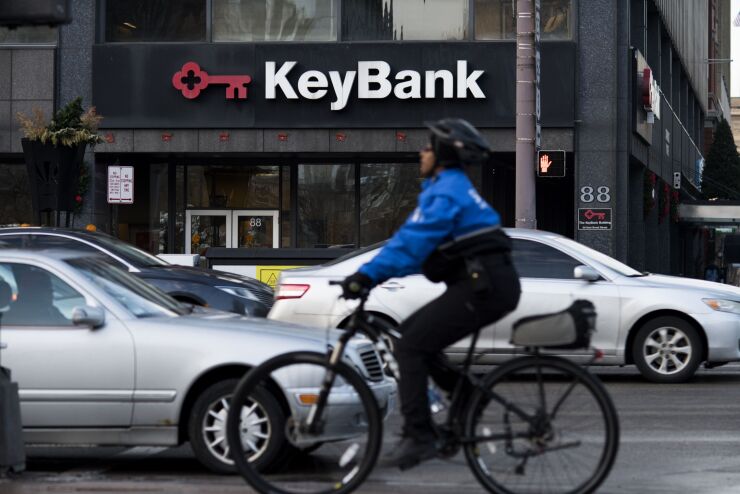UPDATE: This story includes analyst commentary and more details from KeyCorp's earnings call.
Processing Content
Cleveland-based KeyCorp has long been clawing back toward $1 billion of quarterly net interest income, and the marker is finally in sight.
The milestone — which Key confirmed Thursday it is likely to reach in the fourth quarter — will arrive faster thanks to a major investment from Canada's Bank of Nova Scotia.
Scotiabank last month invested $821 million in KeyBank's parent company, giving it the necessary wiggle room to rid itself of some regrettable investments and stick cash into more profitable options. Key did some work of its own, too, by lowering its interest payments to depositors after the Federal Reserve cut interest rates in September.
During the third quarter, Key's net interest income was still below the $1 billion mark, but the $964 million it recorded was up 4.4% from a year ago. The bank foresees more improvement ahead, starting with next quarter, when it expects net interest income to be just above $1 billion.
That guidance was critical since there seems to have been "some nervousness" among investors about the company's net interest income trajectory, Piper Sandler analyst Scott Siefers wrote in a research note.
Key's third-quarter results included plenty of noise, since the securities repositioning it took with Scotiabank's help led to a one-time blow. Key recorded a one-time $737 million charge from selling the bonds, swinging the company's quarterly earnings into negative territory with a $447 million loss.
Excluding the impact of that one-time transaction, KeyCorp's profits rose to $290 million in the quarter, compared with $266 million in the same quarter a year earlier. That bump was partly a result of the improvement in net interest income.
"After wading through the noise, core results look better than we had foreseen," Siefers wrote.
Continued improvement in net interest income would be welcome for Key, whose profits underperformed several other regional banks last year. The company had saddled itself with a relatively large pool of low-yielding bonds, producing small interest payments that dragged down its profits. KeyCorp hasn't consistently hit $1 billion in net interest income since 2022.
Key CEO Chris Gorman said Thursday that the bank saw "strong momentum" during the third quarter in several key businesses. Though the company has struggled to grow loans, Gorman pointed to near-record fee income in investment banking and debt placement, as well as growth in wealth management clients, as sources of strength.
The Scotiabank investment, which gave the Canadian bank a 4.9% stake in Key, led to a "fortuitously timed" sale of relatively low-paying bonds, Gorman said. The bank sold some $7 billion in bonds last quarter at a time when bonds were fetching high prices.
Those bonds were tied to commercial mortgages, and they paid Key yields of just 2.3%. The bonds are somewhat riskier and harder to sell than the ones Key bought to replace them: mortgage-backed securities packaged by government-sponsored entities like Fannie Mae and Freddie Mac.
With mortgage rates still high, KeyCorp was able to lock in bonds whose yields are double than what the previous bonds paid. Key estimated that the switch could boost quarterly net interest income by $40 million.
The bond trades mark only half of Key's planned repositioning. A similar bond trade is expected to occur after Scotiabank completes its $2 billion follow-on investment, which would give it a 14.9% stake in Key. That part of the deal is awaiting approval from the Federal Reserve, and the companies expect it to close in the first quarter of 2025.
The deal specifies that Scotiabank cannot increase its ownership above 19.9% for five years, though some analysts wonder whether the Toronto-based bank is setting itself up to buy Key in full at a later date. Doing so would give it more heft in the United States, where most of its Canadian rivals have retail footprints.
Key has said the Scotiabank deal will enable it to be more "front-footed" as it looks to finance its clients' growth.
Key had been scaling back its operations slightly over the past year. Average loans fell to $106.2 billion during the third quarter, down from $117.6 billion a year earlier. The company attributed the drop to its "planned balance sheet optimization efforts" along with "tepid client loan demand."
Gorman, Key's CEO, told analysts that while the bank is bringing on new clients, it's been "a bit frustrated" by how little money they want to borrow. Companies are holding off on long-term capital investments, higher interest rates have made borrowing unappealing and some firms are still working through inventory they stockpiled after COVID-19-related shortages.
Key has been enjoying more momentum in its fee-driving operations.
Investment banking and debt placement fees came in at $171 million, which Gorman said marked one of the best third quarters in Key's history. He pointed to a possibility that Key may exceed its target of up to $650 million in investment banking fees this year, as long as "markets remain hospitable."
Also during the third quarter, the assets in Key's wealth management division reached a record $61 billion, up 16% from last year.
Key recorded $154 million in net loan charge-offs, more than double the $71 million it reported in the year-ago quarter. The charge-offs didn't suggest any broad trends, Gorman said, instead reflecting "idiosyncratic" issues that affected two companies in the consumer products sector and one equipment manufacturer.
Key said that its nonperforming loans rose to 0.69% of total loans, up from 0.39% in the year-ago quarter, but Gorman said that metric should be "pretty flat" going forward.







